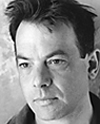

 |
 |
|
Brad KesslerFrom the novel Birds in FallThe smoke seeped in slowly and curled to the ceiling. The smell of burning plastic was distinct now. The video monitors were still working and showed we were twenty miles from Halifax. A man in a silk prayer shawl stood bobbing up and down in the aisle, the white cloth a cowl over his head. The girl with the earphones still lay fast asleep; no one apparently had woken her. Now and again a pilot or a flight attendant raced up the aisle, urging us to keep calm. We all had our life vests on by then - some inflated theirs against instructions, and you could hear the alarming pffffff of them filling with air. The cellist found my hand across the cello case and burrowed her fingers into mine, as if to hide them there. Others were grabbing hands across the aisles. I kept jerking open my jaw to pop the unbearable pressure in my ears; the cellist was doing the same. (I imagine, in the end, we all looked like fish.) An eerie whistling filled the fuselage like someone blowing into a soda bottle. The cellist named the notes as we were going down. The pilot was uttering the word "pan, pan, pan." We could hear it over the intercom. It sounded as if he were shouting for bread. We dropped between layers of atmosphere. Clouds tore past the wing. The whistling lowered to a gentle warble, the fuselage a flute with one hole left open, an odd arpeggio in the rear of the plane. Someone shouted land! and I pressed my forehead to Plexiglas and saw, between scraps of cloud, lights below, pink clusters like brush fire, four or five of them, the brief flames of villages and towns checkerboarded, scalloped along the coast, yet distant; and some began to cheer, thinking, We will make it; we are so close to land, Halifax couldn't be far. We were coming over the spine of the world, out of the night, into the welcoming sodium lights of Canada. We hit clouds again and the plane shuddered; the ocean hurled to the left, and the plane rammed hard to the right. Oxygen masks sprang from the ceiling panel and swung in front of our faces. I caught mine and helped the cellist with hers. The plastic was the color of buttercups. She took the belt off her cello and unfastened the buckles. Help me! she screamed through her mask. She was in a sudden rush, fumbling, standing, a flight attendant shouting for her to sit. I helped her prop open the shiny plastic case and saw inside the instrument - amber-toned, varnish gleaming, the grain a fine and lustrous brown. In its capsule of red velvet it looked like a nesting doll. She slipped a finger in through the F-hole and touched the sound post and closed her eyes. The instrument was humming a sympathetic vibration. It's the D, she whispered. It'll be safer with the case closed, I said. She leaned over and kissed the cello's neck and let the cover drop. The cabin rattled. The bulkheads shook. The overhead bins popped open. Bags, briefcases, satchels rained down. The cellist clenched her eyes. I felt her fingers tightened on mine - but it was Ana I felt beside me. We broke cloud cover and dropped into a pool of dark. The bones around my cheeks pressed into my skull. I saw the sheet music flattened like a stamp on the ceiling. The metamorphoses. I couldn't tell which way was up and which was down and out the window a green light stood on the top of the world, a lighthouse spun above us, a brief flame somewhere in the night. Did I feel it then, the beginning of this pilgrimage, from air to thinner air, from body to body, before the impact? Was it then or after or in between, before the seat belts locked our pelvises in place and unleashed the rest of us. The ilium. Why is it the same name for Troy? Ana once asked, tracing the upper bone of my hip with her finger. Because it's a basin, I said, and told her the Latin word ilia. More like wings, she said and climbed above me and laid the two points of her hips on top of mine. Our bones tapped together, like spoons. The cabin burst into light, sunbright, dazzling, an orange edging around it. I could see the bones beneath my flesh like pieces of pottery. And then we were entering the sea. From BIRDS IN FALL by Brad Kessler. Copyright © 2006 by Brad Kessler. Reprinted by permission of Scribner, a Division of Simon & Schuster, Inc., NY.
|
National Endowment for the Arts · an independent federal agency
1100 Pennsylvania Avenue NW
Washington, DC 20506
 Brad Kessler is the author of Birds in Fall (Scribner) and Lick Creek (Scribner), as well as several award-winning children's books. His work has appeared in numerous publications, including The New Yorker, The Nation, The Kenyon Review, The New York Times Magazine and Bomb. He is a recipient of the Lange-Taylor Prize from Duke University's Center for Documentary Studies. He lives in Vermont with his wife, the photographer Dona Ann McAdams. Photo by Dona Ann McAdams
|